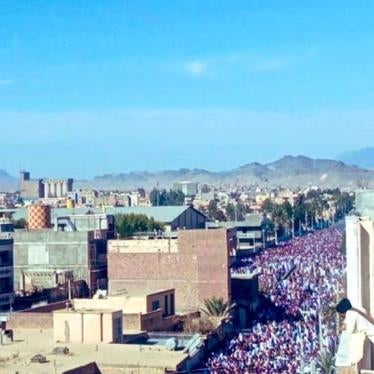(Beirut) – Iranian authorities have issued heavy prison sentences for at least two dozen activists from the Azeri minority since October 2024, without showing real evidence, Human Rights Watch said today. Azeris are the largest ethnic minority in Iran.
The Tehran appeals court, Branch 36, has upheld harsh prison sentences for 10 Azeri activists issued by Judge Abolqasem Salavati of Branch 15 of Tehran’s Islamic Revolutionary Court on charges of “propaganda against the state,” “assembly and collusion with the intent to act against national security,” and “espionage.” Sentences ranged from 3 to 14 years.
“Iranian authorities systematically target civil society and ethnic minorities with abusive charges and heavy prison sentences to silence dissent,” said Nahid Naghshbandi, acting Iran researcher at Human Rights Watch. “This repression is an attempt to crush civil society and prevent ethnic minorities from demanding their basic rights.”
Human Rights Watch interviewed five informed sources about the prison sentences for Azeri activists, as well as the health conditions of those arrested in two separate cases. Human Rights Watch also reviewed court documents of two of the cases.
In the case of the 10 Azerbaijani activists, Ayaz Seifkhah was sentenced to 14 years in prison; Araz Aman Zeinabad and Bagher Hajizadeh Mazraeh to 13 years; Karam Mardaneh Mostalibeyglu to 11 years; Taher Naghavi and Morteza Parvin Joda to 6 years; Salar Taher Afshar, Fatemeh Atash Khiavi-Nasab, and Saeed Minai Qeshlaq to 5 years; and Hassan Ebrahimi to 3 years.
Previously, in October 2024, Branch 15 of the Tehran Revolutionary Court had also issued prison sentences in connection with this case on charges of "assembly and collusion with the intent to act against national security” for five other Azeri activists. The sentences included 4 years for Vadood Asadi, 6 years for Abdolaziz Azimi Ghadim, 5 years for Hossein Piri, 3 years for Kamal Noori, and 3 years for Soleiman Mohammadi.
The Human Rights Activists News Agency reported that all 10 were arrested on February 6 and 7, 2024, in various cities such as Urmia, Bonab, Ardabil, Tabriz, and Karaj. Some were released on bail, while others remain in prison.
An informed source told Human Rights Watch that the authorities did not present any evidence to support the charges. The authorities have primarily cited their past activism on issues like environmental concerns over Lake Urmia, a salt lake in Iran which is the largest lake in the Middle East, and advocating for the civil rights of ethnic groups in Iran, as well as their publications on these topics. In the case of Taher Naghavi, a lawyer, the authorities also documented his work representing clients who were family members of protesters killed or injured during the 2022 protests in Iran.
Naghavi, who is in Evin Prison, has been denied access to medical care. An informed source told Human Rights Watch that “Mr. Naghavi suffers from multiple health issues, and even the prison clinic has recommended an MRI and specialist care for his prostate and spine. Yet, the authorities refuse to act. While his condition is worsening, he has been saying that he can’t sleep due to pain, and his right hand is so numb and weak that he can’t lift or hold anything. We are deeply concerned about his health.”
Human Rights Watch has previously documented Iranian authorities’ pattern of restricting health care to detainees. Prison officials have used such restrictions as a tool to try to silence dissent but have faced no accountability. Iranian authorities have consistently failed to investigate instances of medical neglect or hold those responsible to account.
In a separate case, Branch 15 of the Tabriz Islamic Revolutionary Court summoned 13 Azeri activists for their final defense. These activists were arrested between September and November 2023, and they were kept in solitary confinement for days during their detention, where they were subjected to psychological pressure to confess, sources said.
The activists are Araz Ebrahimnejad, Davood Shiri, Mehrdad Qaderi, Ayat (Yoorosh) Mehrali-Beyglu, Hamed Yeganehpour, Seyed Mohammadreza Movahed, Amirhossein Aghaei, Ali Babaei, Javad Soodbar, Morteza Nourmohammadi, Hossein Azadi, Naser Razmjoo, and Ebrahim Avazadeh. They were charged with “membership in an opposition group” and “conspiracy against the country.” In the case of Mehrali-Beyglu, the charge was “forming an opposition group against the state.”
These accusations are related to their advocacy of civil rights and the rights of ethnic minorities in the country. Yet, during their interrogations, the charges were based on unfounded claims, such as involvement in the formation of the “Demokratler” group and their role in leading field operations during the 2022 protests.
On October 1, 2024, Branch 15 of the Tehran Islamic Revolutionary Court sentenced Seyed Mohammadreza Faqihi, an Azeri lawyer, to five years in prison, along with a two-year ban from practicing law, on charges of “conspiracy to commit a crime against national security.” The charges were related to his participation in a gathering in front of the Iran Central Bar Association in Tehran during the 2022 nationwide protests in Iran, as well as his legal representation of protesters from the 2022 protests and other human rights defenders. On January 21, 2025, he was transferred to Evin Prison to serve his five-year prison sentence.
“Iranian authorities target anyone who advocates for the rights of ethnic and religious minorities, labeling them as separatists and accusing them with baseless charges,” Naghshbandi said. The authorities should drop all these unlawful accusations against these Azeri prisoners, release those currently imprisoned, and uphold the right of people to advocate for civil rights and minority rights.”








